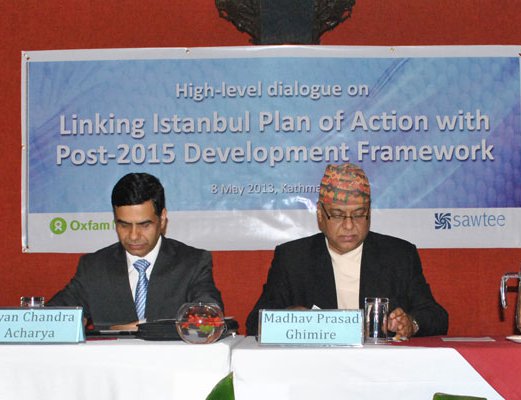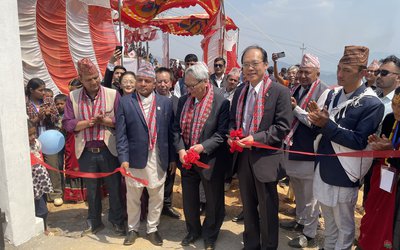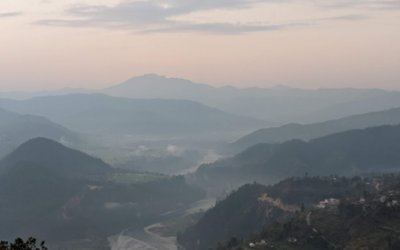
The Millennium Development Goals (MDGs) that are due to expire in 2015 have been partly successful in that some of the goals and targets set in them have been met by many countries, including the least-developed countries (LDCs). However, there are a number of unfinished agendas which the post-2015 development agenda has to carry forward, specifically keeping the LDCs at the centre. This was the view of the panelists of the High-level Dailogue on Linking Istanbul Plan of Action with Post-2015 Development Framework, organized by South Asia Watch on Trade, Economics and Environment (SAWTEE) in Kathmandu.
Speaking at the programme, Gyan Chandra Acharya, Under-Secretary-General and High Representative for the Least Developed Countries, Landlocked Developing Countries and Small Island Developing States, the United Nations, said that the partial success of the MDGs need to be appreciated. He also stated that the Istanbul Programme of Action (IPoA), which takes a wholistic view of LDCs’ development, including building their productive capacity, among others, needs to taken into account while formulating the post-2015 development agenda. The post-2015 development agenda has to be more ambitious than the MDGs, and the issues set forth in the IPoA need to be integrated in them. Focus should be on agriculture development, including increasing investment in agriculture, since it is the sector in which most of the poor people in the LDCs depend on. On the need for resources to meet the development goals, as stipulated in the IPoA, he opined that there is the need to mobilize national resources effectively, while emphasizing that the developed countries have a greater responsibility in providing the much needed resources in the context that MDG 8—global partnership for development—has remained one of the weakest areas.
Professor Mustafizur Rahman, Executive Director, Centre for Policy Dialogue (CPD), Dhaka,presented the LDCs’ Perspectiveson the Post-2015 Development Framework. His major contention was that when the MDGs were put in place, the voice of the South was very limited. But now that the world had undergone major shifts and that the global South has emerged as a strong power, learning from what did not work in the MDGs, the South needs to have a strong voice in the post-2015 development agenda formulation process. He specifically argued that ending poverty rather than reducing poverty should be the goal of the post-2015 development agenda, and for that to materialize, apart from building on the MDGs, new and important issues such as the rights of migrant workers should also be included in the post-2015 development framework.
The Chief Guest of the programme, Madhav Prasad Ghimire, Minister for Home and Foreign Affairs, Government of Nepal, said that the post-2015 development agenda should be open, transparent and measurable. The LDCs should be kept at the centre of the agenda and adequate resources to help them meet their development needs should be provided. LDCs shoud also be provided with additional and predictable resources to address the emerging challenges facing the LDCs, such as climate change.
Dr. Posh Raj Pandey, Executive Chairman, SAWTEE, Kathmandu, delivering the Chair’s remarks, said that the post-2015 development agenda should be a continuation of the MDGs with some necessary revisions. It should be formulated in a way that would address the weaknesses of the MDGs and would address the formidable challenges of the humankind, the most deprived of whom live in the LDCs.
The event was participated by about 100 participants ranging from government officials to representatives of intergovernmental organizations, development partners, international and national non-governmental organizations, private sector, academia, practitioners, and the media, among others.
- TANAHU HYDROPOWER PROEJCT: A Significant Achievement
- Apr 15, 2024
- AMBASSADOR HANAN GODAR: Sharing Pain With A Nepali Family
- Mar 30, 2024
- VISIT OF KfW AND EIB TO NEPAL : Mission Matters
- Mar 25, 2024
- NEPAL BRITAIN SOCIETY: Pratima Pande's Leadership
- Mar 24, 2024
- NEPAL ARMY DAY: Time To Recall Glory
- Mar 15, 2024
















